- Home
- Ken Follett
Triple (1991) Page 3
Triple (1991) Read online
Page 3
Towfik did not like his work. When it was dull he was bored, and when it was exciting he was frightened. But they had told him that there was important, dangerous work to be done in Cairo, and that he had the qualities necessary to a good spy, and that there were not enough Egyptian Jews in Israel for them to be able just to go out and find another one with all the qualities if he said no; so, of course, he had agreed. It was not out of idealism that he risked his life for his country. It was more like self-interest: the destruction of Israel would mean his own destruction; in fighting for Israel he was fighting for himself; he risked his life to save his lif& It was the logical thing to do. Still, he looked forward to the tirne~--in five years? Ten? Twenty?-when he would be too old for field work, and they would bring him home and sit him behind a desk, and he could find a nice Jewish girl and marry her and settle down to enjoy the land he had fought for. Meanwhile, having lost Professor Schulz, he was following the wife. She continued to see the sights, escorted now by a young Arab who had presumably been laid on by the Egyptians to take care of her while her husband was away. In the evening the Arab took her to an Egyptian restaurant for dinner, brought her home, and kissed her cheek under the jacaranda tree in the garderL The next morning Towfik went to the main post office and sent a coded cable to his uncle in Rome:
SCHULZ MET AT AIRPORT BY SUSPECTED LOCAL AGENT. SPENT TWO DAYS SIGHTSEE ING. PICKED UP BY AFORESAID AGENT AND DRIVEN DIRECTION QATTARA. SURVEIL LANCE ABORTED. NOW WATCHING WIFF- He was back in Zamalek at nine Am. At eleven-thirty he saw Fran Schulz on a balcony, drinking coffee, and was able to figure out which of the apartments was the Schulzes'- By lunchtime the interior of the Renault had become very hot. Towfik ate an apple and drank tepid beer from a bottle. Professor Schulz arrived late in the afternoon, in the Same gray Mercedes. He looked tired and a little rumpled, like a middle-aged man who had traveled too far. He left the car and went into the building without looking back. After dropping him, the agent drove past the Renault and looked straight at Towfik for an instant. There was nothing Towfik could do about it. Where had Schulz been? It had taken him most of a day to get there, Towfik speculated; he had spent a night, a full day and a second night there; and. it had taken most of today to get bacL Qattara was only one of several possibilities: the desert road went all the way to Matruh on the Mediterranean coast; there was a turnoff to Karkur Tohl in the far south; with a change of car and a desert guide they could even have gone to a rendezvous on the border with Libya. At nine P.M. the Schulzes came out again. The professor looked refreshed. They were dressed for dinner. They walked a short distance and hailed a taxi. Towfik made a decision. He did not follow them. He got out of the car and entered the garden of the building. He stepped onto the dusty lawn and found a vantage point behind a bush from where he could see into the hall through the open front door. The Nubian caretaker was sitting on a low wooden bench, picking his nose. Towfik waited. Twenty minutes later the man left his bench and disappeared into the back of the building. Towfik hurried through the hall and ran, soft-footed, up the staircase. He had three Yale-type skeleton keys, but none of them fitted the lock of apartment three. In the end he got the door open with a piece of bendy plastic broken off a college setsquare. He entered the apartment and closed the door behind him. It was now quite dark outside. A little light from a streetlamp came through the unshaded windows. Towfik drew a small flashlight from his trousers pocket, but he did not switch it on yet. The apartment was large and airy, with white-painted walls and English-colonial furniture. It had the, sparse, chilly look of a place where nobody actually lived. There was a big drawing room, a dining room, three bedrooms and a kitchen. After a quick general survey Towfik started snooping in earnest.
The two smaller bedrooms were bare. In the larger one. Towfik went rapidly through all the drawers and cupboards. A wardrobe held the rather gaudy dresses of a woman past her prime: bright prints, sequined gowns, turquoise and orange and pink. The labels were American. Schulz was an Austrian national, the cable had said, but perhaps he lived in the USA. Towfik had never heard him speak. On the bedside table were a guide to Cairo in English, a copy of Vogw and a reprinted lecture on isotopes. So Schulz was a scientist. Towfik glanced through the lecture. Most of it was over his head. Schulz must be a top chemist or physicist, he thought. If he was here to work on weaponry, Tel Aviv would want to know. There were no personal papers-Schulz evidently had his passport and wallet in his pocket. The airline labels had been removed from the matching set of tan suitcases. On a low table in the drawing room, two empty glasses smelled of gin: they had had a cocktail before going out. In the bathroom Towfik found the clothes Schulz had worn into the desert. There was a lot of sand in the shoes, and on the trouser cuffs he found small dusty gray smears which might have been cement. In the breast pocket of the rumpled jacket was a blue plastic container, about one-and-a-half inches square, very slender. It contained a light-tight envelope of the kind used to protect photographic film. Towfik pocketed the plastic box. The airline labels from the luggage were in a wastebasket in the little hall. The Schulzes' address was in Boston, Massachusetts, which probably meant that the professor taught at Harvard, MIT or one of the many lesser universities in the area. Towflk did some rapid arithmetic. Schulz would have been in his twenties during World War II: he could easily be one of the German rocketry experts who went to the USA after the war. Or not. You did not have to be a Nazi to work for the Arabs. Nazi or not, Schulz was a cheapskate: his soap, toothpaste and after-shave were all taken from airlines and hotels. On the floor beside a rattan chair, near the table with the empty cocktail glasses, lay a lined foolscap notepad, its top sheet blank. There was a pencil lying on the pad. Perhaps Schulz had been making notes on his trip while he sipped his gin sling. Towfik searched the apartment for sheets torn from the pad. He found them on the balcony, burned to cinders in a large glass ashtray. Ihe night was cool. Later in the year the air would be warm and fragrant with the blossom of the jacaranda tree in the garden below. The city traffic snored in the distance. It reminded Towfik of his fathees apartment in Jerusalem. He wondered how long it would be before he saw Jerusalem again. He had done all he could here. He would look again at that foolseap pad, to see whether Schulz's pencil had pressed hard enough to leave an impression on the next page. He turned away from the parapet and crossed the balcony to the French windows leading back into the drawing room. He had his hand on the door when he heard the voices. Towilk froze. "rm sorry, honey, I just couldn't face another overdone steak." "We could have eaten something, for God's sake." Tle Schulzes were back. Towilk. rapidly reviewed his progress through the roomi: bedrooms, bathroom, drawing room, kitchen . . . he had replaced everything he had touched, except the little plastic box. He had to keep that anyway. Schulz would have to assume he had lost it. If Towfik could get away unseen now, they might never know he had been there. He bellied over the parapet and hung at full length by his fingertips. It was too dark for him to see the ground. He dropped, landed lightly and strolled away. It had been his first burglary, and he felt pleased. It bad gone as smoothly as a training exercise, even to the early return of the occupant and sudden exit of spy by prearranged emergency route. He grinned in the dark. He might yet live to see that desk job. He got into his car, started the engine and switched on the lights. Two men emerged from the shadows and stood on either side of the Renault Who ... ?
He did not pause to figure out what was going on. He rammed the gearshift into first and pulled away. The two men hastily stepped aside. They had made no attempt to stop him. So why had they been there? To make sure he stayed in the car ... ? He jammed on the brakes and looked into the back seat, and then he knew, with unbearable sadness, that he would never see Jerusalem again. A tall Arab in a dark suit was smiling at him over the snout of a small handgun. "Drive on," the man said in Arabic, "but not quite so fast, please."
Q: What is your name? A: Towfik el-Masiri. Q: Describe yourseff. A: Age twenty-six, five-foot-nine, one hundred and eighty pounds,
brown eyes, black hair, Semitic features, light brown skin. Q: Who do you work for? A I am a student. Q What day is today? A: Saturday. Q: What is your nationality? A: Egyptian. Q: What is twenty mintis seven? A: Thirteen. The above questions are designed to facilitate fine calibration of the lie detector. Q: You work for the CIA. A : No. (TRuE) Q: The Germans? A: No.(TRUE) Q: Israel, then. A: No. (FALSE) Q: You really are a student? A: Yes. (FALSE) Q: Tell me about your studies. A : I'm doing chemistry at Cairo University. (TRUE) I'm interested in polymers. (TRuE) I want to be a petrochemical engineer. (FALSE) Q: What are polymers?
A:Complex organic compounds with long-chain molecules----the commonest is polythene. (TRUE) Q: What is your name? A: I told you, Towfik el-Masiri. (Fnw) Q :The pads attached to your head and chest measure your pulse, heartbeat, breathing and perspiration. When you tell untruths, your metabolism betrays you-you breathe faster, sweat more, and so on. This machine, which was given to us by our Russian friends, tells me when you are lying. Besides, I happen to know that Towfik el-Masiri is dead. Who are you? A: (no reply) Q:Ile wire taped to the tip of your penis is part of a different machine. It is connected to this button here. When I press the button- A: (scream) Q:--an electric current passes through the wire and gives you a shock. We have put your feet in a bucket of water to improve the efficiency of the apparatus. What is your name? A: Avram Ambache. The electrical apparatus interferes with the functioning of the lie detector. Q: Have a cigarette. A: Thank you. Q:Believe it or not, I hate this work. The trouble Is, people who like it are never any good at it-you need sensitivity, you know. I'm a sensitive person ... I hate to see people suffer. Don!t you? A: (no reply) Q:You're now trying to think of ways to resist me. Please don't bother. There is no defense against modem techniques of . . . interviewing. What is your name? A : Avraw Ambache. (TRuE) A: Who is your control? A: I don't know what you mean. (PALsE) Q : Is it Bosch? A: No, Friedman. (READwa mDETERmiNATE) Q: It is Bosch. A: Yes. (PALsE) Q: No, it's not Bosch. Tt's Krantz. A: Okay, it's Krantz-whatever you say. (TRuE)
Q: How do you make contact? A: I have a radio. (PALsE) Q: You're not telling me the truth. A: (scream) Q: How do you make contact? A : A dead-letter box in the faubourg. Q:' You are thinking that when you are in pain, the lie detector will not function properly, and that there is therefore safety in torture. You are only partly right. This is a very sophisticated machine, and I spent many months learning to use it properly. After I have given you a shock, it takes only a few moments to readjust the machine to your faster metabolism; and then I can once more tell when you are lying. How do you make contact? A: A dead-letter-(scream) Q:Ali! He's kicked his feet free-these convulsions are very strong. Tie him again, before he comes round. Pick up that bucket and put more water in it. (pause) Right, he's waking, get out. Can you hear me, Towfik? A: (indistinct) Q: What is your name? A : (no reply) Q: A little jab to help you A : (scream) Q: -to think. A: Avram Ambacbe. Q- What day is today? A: Saturday. Q What did we give you for breakfast? A Fava beans. Q: What is twenty minus seven? A: Thirteen. Q : What is your profession? A:I'm a student. No don't please and a spy yes I'm a spy don't touch the button please oh god oh god- How do you make contact? A: Coded cables. Q:Have a cigarette. Here ... oh, you don't seem to be able to hold it between your lips-let me help ... there. A: Thank you.
Q: Just try to be calm. Remember, as long as you're telling the truth, there will be no pain. (pause) Are you feeling better? A: Yes. Q: So am I. Now, then, tell me about Professor Schulz. Why were you following him? A: I was ordered to. (TRuE) Q: By Tel Aviv? A: Yes. (TRuE) Q: Who in Tel Aviv? A: I don't know. (READING iNDETERmiNATE) Q: But you can guess. A: Bosch. (READING INDETERmiNATE) Q: Or Krantz? A: Perhaps. (TRuE) Q: Krantz is a good man. Dependable. How's his wife? A: Very well, -(scream) Q: His wife died in 1958. Why do you make me hurt you? What did Schulz do? A: Went sightseeing for two days, then disappeared into the desert in a gray Mercedes. Q: And you burglarized his apartment A: Yes. (TRuE) Q: What did you learn? A: He is a scientist. (TRUE) Q: Anything else? A: American. (TRuE) That's all. (TRu*E) Q: Who was your instructor in training? A: Ertl. (READING INDETERMINATE) Q: That wasn't his real name, though. A: I don't know. (FALSE) Nol Not the button let me think it was just a minute I think somebody said his real name was Manner. (TituR) Q: Oh, Manner. Shame. He's the old-fashioned type. He still believes you can train agents to resist interrogation. It's his fault you're suffering so much, you know. What about your colleagues? Who trained with you? A: I never knew their real names. (FALSE) Q - Didn't you? A: (scream) Q: Real names. A: Not all of them- Q: Tell me the ones you did know. A: (no reply) (scream) The prisoner fainted. (pause) Q: What is your name? A: Uh... Towfik. (scream) Q: What did you have for breakfast? A: Don't know. Q: What is twenty minus seven? A: Twenty-seven. Q: What did you tell Krantz about Professor Schulz? A: Sightseeing ... Western Desert ... surveillance aborted.. . Q: Who did you train with? A: (no reply) Q: Who did you train with? A: (scream) Q: Who did you train with? A:Yea, though I walk through the valley of the shadow of death- ' Q: Who did you train with? A: (scream) The prisoner died.
When Kawash asked for a meeting, Pierre Borg went. There was no discussion about times and places: Kawash sent a message giving the rendezvous, and Borg made sure to be there. Kawash was the best double agent Borg had ever had, and that was that. The head of the Mossad stood at one end of the northbound Bakerloo Line platform in Oxford Circus subway station, reading an advertisement for a course of lectures in Theosophy, waiting for Kawash. He had no idea why the Arab had chosen London for this meeting; no idea what he told his masters be was doing in the citv-, no idea, even, why Kawash was a traitor. But this man had helped the Israelis win two wars and avoid a third, and Borg needed him. Borg glanced along the platform, looking for a high brown bead with a large, thin nose. He had an idea he knew what Kawash wanted to talk about. He hoped his idea was right. Borg was very worried about the Schulz affair. It had started out as a piece of routine surveillance, juit the right kind of assignment for his newest, rawest agent in Cairo: a high-powered American physicist on vacation in Europe decides to take a trip to Egypt. - The first warning sign came when Towilk lost Schulz. At that point Borg had stepped up activity on the project. A freelance journalist in Milan who occasionally made Inquiries for German Intelligence had established that Schules air ticket to Cairo had been paid for by the wife of an Egyptian diplomat in Rome. Then the CIA had routinely passed to the Mossad a set of satellite photographs of the area around Qattara which seemed to show signs of construction work-and Borg had remembered that Schulz had been heading,in the direction of Qattara when Towfik lost Win. Something was going on, and he did not know what, and that worried him. He was always worried. If it was not the Egyptians, it was the Syrians; if it was not the Syrians it was the Fedayeen; if it was not his enemies it was his friends and the question of how long they would continue to be his friends. He had a worrying job. His mother had once said, "Job, nothing-you were born worrying, like your poor father-if you were a gardener you would worry about your job." She might have been right but all the same, paranoia was the only rational frame of mind for a spyinaster. Now Towfik had broken contact, and that was the most worrying sign of all. Maybe Kawash would have some answers. A train thundered in. Borg was not waiting for a trafiL He began to read the credits on a movie poster. Half the names Were Jewish. Maybe I should have been a movie producer, he thought. The train Pulled out, and a shadow fell over Bor& He looked up into the calm face of Kawash. The Arab said, 'Thank you for coming.- He always said that Borg ignored it: be never knew how to respond to thanks. He said, 'Vhat's new?" "I had to pick up one of Your youngsters in Cairo on Friday. " "You had tor
"Military Intelligence were bodyguarding a VIP, and they spotted the kid tailing them. Military don't have operational personnel in the city, so they asked my department to pick him up. It was an official request." "God damn," Borg said feelingly. "What happened to himro "I had to do it by the book," Kawash said. He looked very sad. "rhe boy was interrogated and killed. His n
ame was Avrarn Ambache, but he worked as Towfik el-Masiri." Borg frowned. "He told you his real name?" "He's dead, Pierre." Borg shook his head irritably: Kawash always wanted to linger over personal aspects. "Why did he tell you his name?" "Were using the Russian equipment-the electric shock and the lie detector together. You're not training them to cope with it." Borg gave a short laugh. "If we told them about it, wed never get any fucking recruits. What else did he give awayr' "Nothing we didn't know. He would have, but I killed him first." "You killed him?" "I conducted the interrogation, in order to make sure he did not say anything important. All these interviews are taped now, and the transcripts filed. We're learning from the Russians." The sadness deepened in the brown eyes. "Why-would you prefer that I should have someone else kill your boysr' Borg stared at him, then looked away. Once again he bad to steer the conversation away from the sentimental. "What did the boy discover about Schulz?" "An agent took the professor into the Western Desert." "Sure, but what for?" "I don't know." "You must know, you're in Egyptian Intelligence!" Borg controlled his irritation. Let the man do things at his own pace, he told himself; whatever information he's got, he'll tell. "I don't know what they're doing out there, because they've set up a special group to handle it," Kawash said. "My department isn't informed." "Any idea why?" The Arab shrugged. "I'd say they don't want the Russians to know about it. These days Moscow gets everything that goes through us."

 The Pillars of the Earth
The Pillars of the Earth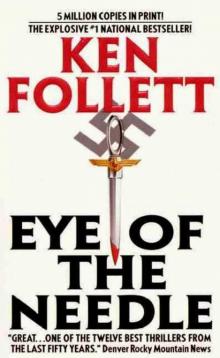 Eye Of The Needle
Eye Of The Needle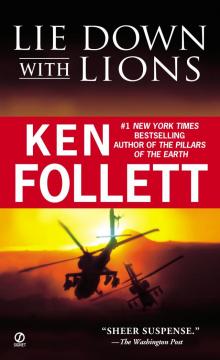 Lie Down With Lions
Lie Down With Lions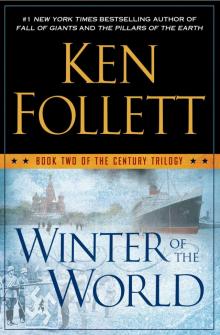 Winter of the World
Winter of the World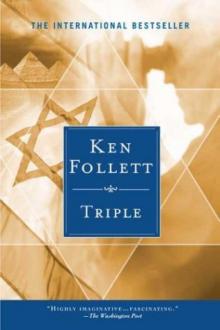 Triple
Triple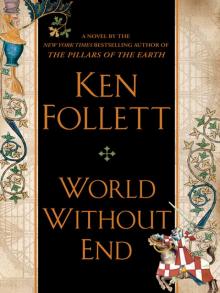 World Without End
World Without End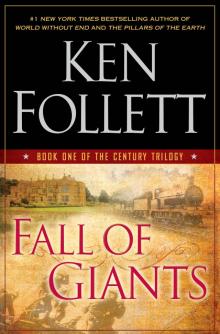 Fall of Giants
Fall of Giants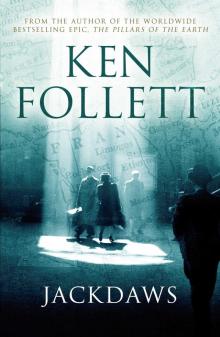 Jackdaws
Jackdaws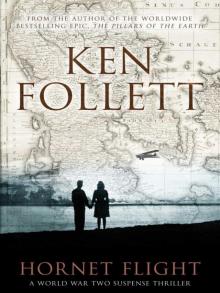 Hornet Flight
Hornet Flight Whiteout
Whiteout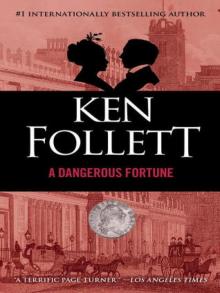 A Dangerous Fortune
A Dangerous Fortune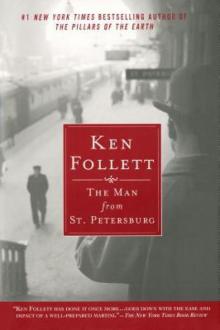 The Man From St. Petersburg
The Man From St. Petersburg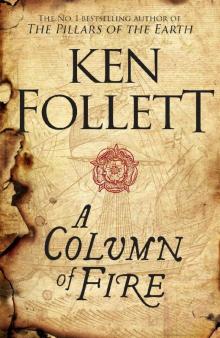 A Column of Fire
A Column of Fire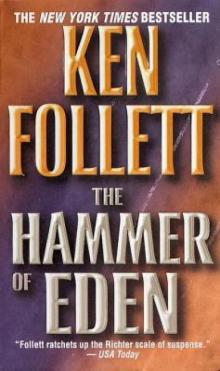 The Hammer of Eden
The Hammer of Eden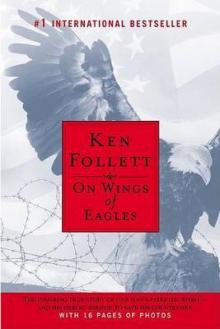 On Wings of Eagles
On Wings of Eagles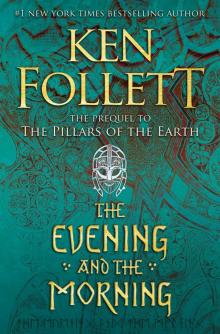 The Evening and the Morning
The Evening and the Morning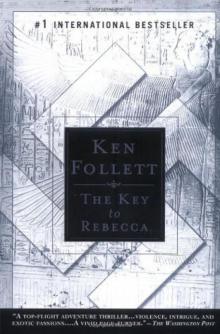 The Key to Rebecca
The Key to Rebecca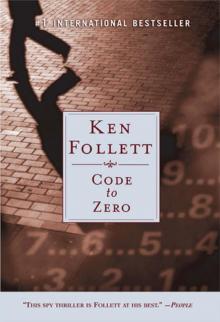 Code to Zero
Code to Zero Paper Money
Paper Money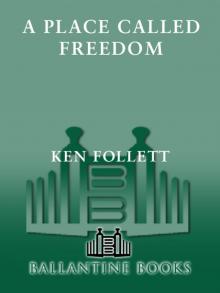 A Place Called Freedom
A Place Called Freedom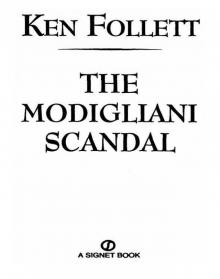 The Modigliani Scandal
The Modigliani Scandal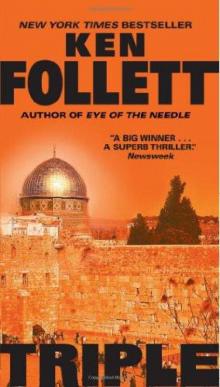 Triple (1991)
Triple (1991)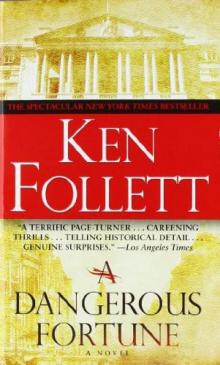 A Dangerous Fortune (1994)
A Dangerous Fortune (1994)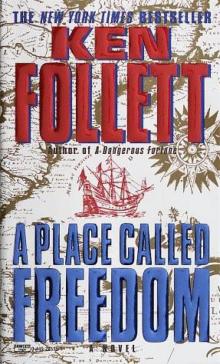 A Place Called Freedom (1995)
A Place Called Freedom (1995)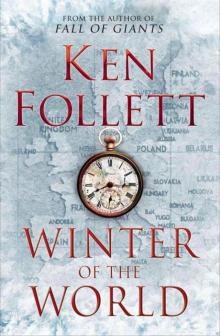 Winter of the World (Century Trilogy 2)
Winter of the World (Century Trilogy 2)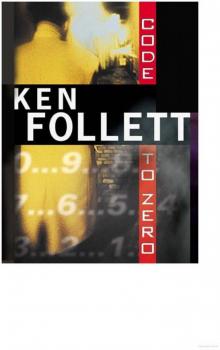 Code to Zero (2000)
Code to Zero (2000)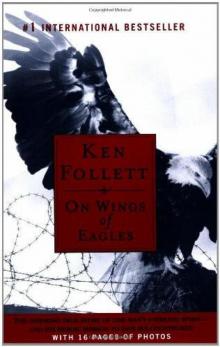 On Wings Of Eagles (1990)
On Wings Of Eagles (1990)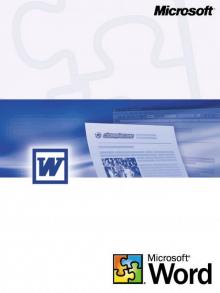 Storm Island
Storm Island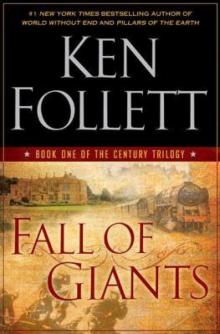 Fall of Giants (The Century Trilogy)
Fall of Giants (The Century Trilogy)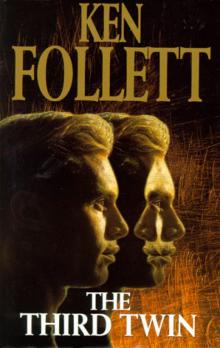 the Third Twin (1996)
the Third Twin (1996)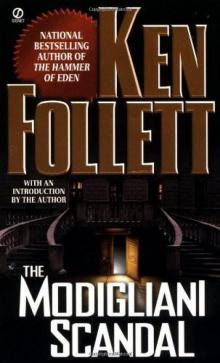 The Modigliani Scandal (1976)
The Modigliani Scandal (1976)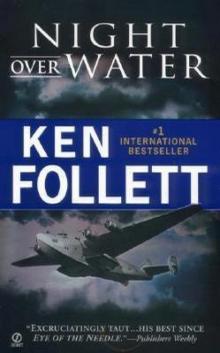 Night Over Water
Night Over Water